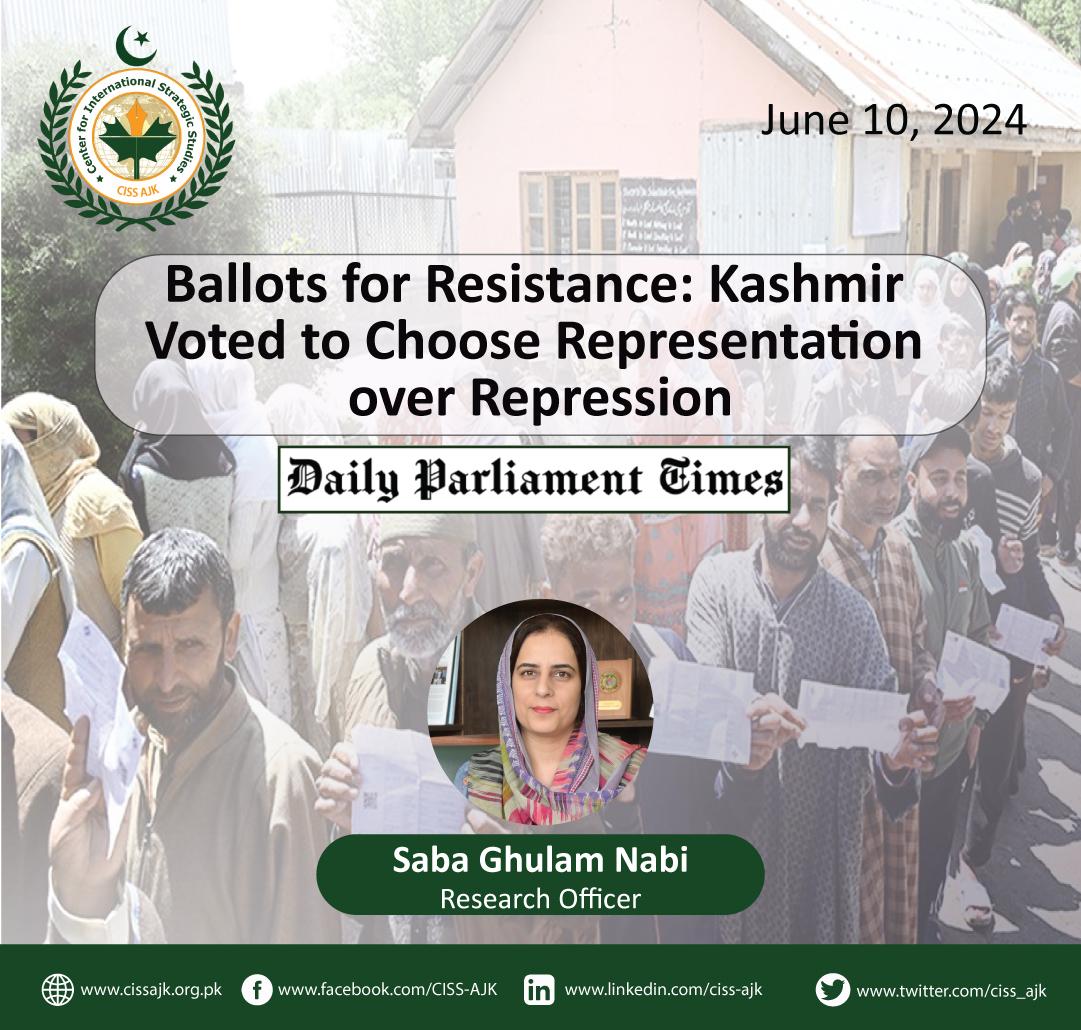488
Asthe Bharatiya Janta Party (BJP) was anticipating a huge victory, the election results of 2024 came as a shock to the right-wing Hindu ethno-nationalist political party because it dashed its hopes of forming a powerful two-third majority to the ground. The election results testify to the conviction that Indian people have distanced themselves from the extremist Hindutva agenda promoted by the BJP. Since the revocation of Article 370 by the Modi regime in 2019, these were the first elections in Indian Illegally Occupied Jammu and Kashmir (IIOJK).
Everyone was looking forward to the outcome, as the BJP had left no stone unturned to suppress the struggle and stifle peaceful dissent voices of the people in IIOJK. Before the elections, distinct local political parties were banned, and the BJP had set the stage through its proxies to influence and resultantly win the elections.
Numerous claims of development, normalcy, and peace were propagated by the BJP to win the hearts and minds of the people, aiming to fool the international public &media into believing that everything is normal in IIOJK. The political parties who were contesting as BJP proxiesin IIOJK tried their best to appeasethe youth of Kashmir and launched several campaigns to motivate people; cheques were also distributed, and more promises were made to secure votes.
Despite using all means, the BJP proxies did not win any seat in the Kashmir Valley. However, the results surprised everyone andshowed that the people of Kashmir have voted out all the agendas and proxies of the BJP, and its dream of having a chief minister from its party in IIOJK was not fulfilled. Many indigenous parties, including the National Conference, the People’s Democratic Party, and the People’s Conference, were in the fray to contest the elections in Kashmir. Twenty-four candidates, including Waheed Parra from the PDP, Ruhullah Mehdi from the NC, and Ashraf Mir from the JKAP, contested for the seat of Srinagar. The turnout remained very high, and Ruhullah Mehdi won this seat. From the Anantnag-Rajouri seat, the winning candidate is Mian Altaf Ahmed.Srinagar, Baramulla, and Anantnag-Rajouri recorded voter turnouts of 38.49 percent, 59.1 percent, and 54.84 percent, respectively, the highest in the last three decades.
The most surprising victory with high voter turnout was that of jailed candidate Engineer Abdul Rashid, who won against former Chief Minister Omar Abdullah. The victorious candidate is still in Tihar Jail. His victory, against mainstream candidates, signals a significant shift away from traditional political norms and paving the wayfor a “new normal.” Abdul Rashid’s victory also underscores the rejection of the BJP’s “New Kashmir” policies and shows that the true “New Kashmir” is defined by its common people opting for the face of resistance. The results of the 2024 elections in Jammu, where the BJP won two seats (Jammu and Udhampur) with recorded voter turnouts of 68.27 percent and 72.22 percent, respectively, highlight the effectiveness of its groundwork before the elections.
The success affirmed the strategies implemented by the BJP, including the diligent incorporation of Hindu communitiesinto the STs and SCs lists. Before the polls, the BJP expanded legislative seats and introduced new legislation while amending existing ones to declare non-natives of the state as natives, thereby raising its vote bank. Though BJP was not able to win a simple majority over the claims of Modi. The people of Kashmir especiallythe youth have realized that boycotting the election will not do any favor to them rather it will deprive them of having a voice in the political structure of the country. Moreover, the results from IIOJKhave debunked the claims of normalcy and demographic re-orientation. Public opinion has not only kicked out the BJP but also has forcefully rejected dynastic politics. Both Omar Abdullah and Mehbooba Mufti could not get support from the public. Not much can be expected under the BJP-led coalition, but at least one fact is agreed upon, participation (in all processes) is the answer. Despite repression, Kashmiris defiantly wield their votes to challenge the status quo, echoing widespread discontent. Undeterred by threats, journalists courageously reported ground realities, dismantling propaganda. The participation of the locals in elections is not passive acceptance but a strategic move for representation.
Overall, the 2024 elections in Kashmir marked a turning point, with the populace recognizing the importance of political participation. Despite challenges, Kashmiris exercised their voting rights, demanding genuine representation and challenging the status quo. The election results shattered the BJP’s expectations and highlighted that the masses are not aligned with the divisive and unilateral actions executed by New Delhi in IIOJK.



